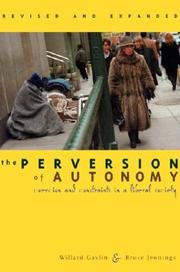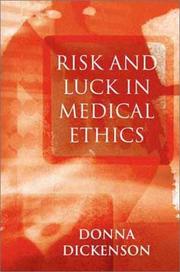| Listing 1 - 2 of 2 |
Sort by
|

ISBN: 0878409068 Year: 2003 Publisher: Washington Georgetown University Press
Abstract | Keywords | Export | Availability | Bookmark
 Loading...
Loading...Choose an application
- Reference Manager
- EndNote
- RefWorks (Direct export to RefWorks)
Modern psychological and political theory meet head-on in this powerful re-evaluation of America's contradictory and sometimes dangerous addiction to individualism. Best-selling author Gaylin and co-author Jennings investigate the contentious intersections of interdependence and autonomy, rights and public responsibility. They examine the painful abrasion occurring between America's tradition of personal freedom and privacy, as it rubs against the still valuable if almost vanishing ideals of sacrifice and social order. Our current culture of autonomy - championed by both liberals on the left and libertarians on the right - is based on the idea of rationality as the motivation for human conduct. But, as the authors remind us, people are not simply rational creatures - appeals to emotions are always far more effective than logical argument in changing our behavior. This timely edition includes a new preface; updated examples and illustrations throughout; and, new coverage of contemporary social critics and their work since the publication of the first edition. Two essential new chapters, one on the movement to forgo life-sustaining treatment and the other on physician-assisted suicide, particularly clarify the authors' arguments. Drawing on these and numerous other illustrations - with significant emphasis on the state of American health care - Gaylin and Jennings demonstrate that society has not just the right but the duty to occasionally invoke fear, shame, and guilt in order to motivate humane behavior. As cases of AIDS are once again on the upswing, as the dangerously mentally ill are allowed to wander free and untreated, as starvation and poverty still hold too many in its grip in the richest nation on the planet, this controversial book, considerably revised and expanded, is needed more than ever. If we are to indeed preserve and nurture a genuinely free - and liberal - society, the authors suggest that these "coercions" may be essential for the health and the maturity of a nation where we all too often avert our eyes, not seeing that our neighbor is in pain or trouble and needs our help.
Social ethics --- Political philosophy. Social philosophy --- United States --- Civil society --- Individualism --- Involuntary treatment --- Libertarianism --- autonomie --- autonomie van de patiënt --- verantwoordelijkheid (verantwoordingsplicht, verantwoording) --- paternalisme (anti-paternalisme) --- gedwongen behandeling (dwangbehandeling) --- sociale uitsluiting --- maatschappelijke evolutie (sociale verandering) --- sociologie (sociologische aspecten) --- socio-economische aspecten (socio-economische factoren) --- filosofie (filosofische aspecten) --- ethiek (ethische aspecten) --- autonomie du patient --- responsabilité (imputabilité, obligation de rendre compte) --- traitement forcé --- exclusion sociale --- évolution sociale (changement social) --- sociologie (aspects sociologiques) --- aspects socio-économiques (facteurs socio-économiques) --- philosophie (aspects philosophiques) --- ethique (aspects ethiques) --- Coerced treatment --- Coercive care --- Coercive treatment --- Compulsory treatment --- Enforced treatment --- Forced treatment --- Treatment, Involuntary --- Patients --- Therapeutics --- Informed consent (Medical law) --- Legal status, laws, etc. --- United States of America

ISBN: 0745621465 0745621457 Year: 2003 Publisher: Cambridge Polity Press
Abstract | Keywords | Export | Availability | Bookmark
 Loading...
Loading...Choose an application
- Reference Manager
- EndNote
- RefWorks (Direct export to RefWorks)
Ethics is commonly assumed to be the one realm in which luck and risk do not intrude. It has been said that 'While one can be lucky in one's business, in one's married life, and in one's health, one cannot, so it is commonly assumed, be subject to luck as far as one's moral worth is concerned.' But although we do not normally hold people responsible for outcomes beyond their control, a serious examination of the role of luck and risk may lead us to conclude that very few outcomes are really within people's control. This is the paradox of 'moral luck'. Risk and Luck in Medical Ethics examines the 'moral luck' paradox in greater detail, relating it to Kantian, consequentialist, and virtue-based approaches to ethics. Dickenson applies the paradoxes of risk and luck to medical ethics, including timely discussion of risk and luck in the allocation of scarce health care resources, informed consent to treatment, decisions about withholding life-sustaining treatment, psychiatry, reproductive ethics, genetic testing, and medical research and evidence-based medicine. The book concludes with an examination of the relevance of risk and luck in a medical context to the study of global ethics. If risk and luck are taken seriously, it would seem to follow that we cannot develop any definite moral standards at all, that we are doomed to moral relativism. However, Dickenson offers strong counter-arguments to this view that enable us to think in terms of universal standards for judging ethical systems. This claim has direct practical relevance for practitioners as well as philosophers.
Fortune. --- Medical ethics. --- Risk. --- Uncertainty. --- moraalfilosofie --- bio-ethiek (medische, biomedische ethiek, bio-ethische aspecten) --- risicomanagement (risico-evaluatie, risicobeheer) --- veiligheid --- geluk (onzekerheid) --- aansprakelijkheid --- verantwoordelijkheid (verantwoordingsplicht, verantwoording) --- ethiek (ethische aspecten) --- philosophie morale --- bioéthique (éthique médicale, biomédicale, aspects bioéthiques) --- évaluation du risque (gestion du risque) --- sécurité (principe de sécurité) --- chance (incertitude) --- responsabilité --- responsabilité (imputabilité, obligation de rendre compte) --- ethique (aspects ethiques) --- Fortune --- Medical ethics --- Risk --- Uncertainty --- Reasoning --- Economics --- Probabilities --- Profit --- Risk-return relationships --- Biomedical ethics --- Clinical ethics --- Ethics, Medical --- Health care ethics --- Medical care --- Medicine --- Bioethics --- Professional ethics --- Nursing ethics --- Social medicine --- Luck --- Opportunity --- Moral and ethical aspects
| Listing 1 - 2 of 2 |
Sort by
|

 Search
Search Feedback
Feedback About
About Help
Help News
News